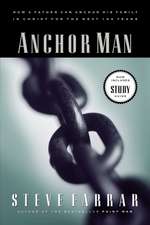Tempered Steel
Autor Steve Farrar, Farraren Limba Engleză Paperback – 28 feb 2002
Preț: 99.14 lei
Nou
Puncte Express: 149
Preț estimativ în valută:
18.97€ • 19.81$ • 15.66£
18.97€ • 19.81$ • 15.66£
Carte disponibilă
Livrare economică 25 martie-08 aprilie
Preluare comenzi: 021 569.72.76
Specificații
ISBN-13: 9781576738924
ISBN-10: 1576738922
Pagini: 280
Dimensiuni: 155 x 231 x 18 mm
Greutate: 0.35 kg
Editura: Multnomah Books
ISBN-10: 1576738922
Pagini: 280
Dimensiuni: 155 x 231 x 18 mm
Greutate: 0.35 kg
Editura: Multnomah Books
Notă biografică
Steve Farrar is the founder and chairman of Men's Leadership Ministries in Bryan/College Station, Texas, and brings his message to thousands of men each year. He holds a master's degree from Western Seminary and an earned doctorate from Dallas Theological Seminary.
Extras
INTRODUCTION
AMERICA HAS BEEN BUILT ON STEEL.
Without steel there would be no railroads to crisscross the nation with freight, no interstate highway system to speed us to Grandma’s house for Thanksgiving, no cars to speed us along those interstates, and no great riverspanning dams to generate electricity for our homes.
The uses of steel are almost beyond imagination.
Generally speaking, steel is an alloy of iron and carbon. You can’t have steel without iron. Iron itself is an alloy. There is a formula for making iron. A recipe. It has been said that making iron is something like baking a cake. The key ingredient in that cake—the “flour,” if you will—is iron ore. And into that iron ore you stir coke, limestone, air, and water. This recipe is cooked in a blast furnace that can be as high as fifteen stories, and achieves temperatures up to 3,000 degrees. The intense heat causes the raw materials to melt together. “The melted iron, freed from impurities, trickles down to the lowest part of the furnace….The slag containing the impurities floats on top of iron four or five feet deep.”
It takes incredible heat to make iron. But in order to get steel, you need even more fire and heat. Steel is stronger than iron, but also flexible, and can be shaped into a number of various products.
There are a number of methods to make steel. One method requires an Open-Hearth furnace—a structure the size of a two-story house, producing temperatures in excess of 3,000 degrees. It is significant that each batch of steel made in a furnace is called a “heat.”
Another method is the Bessemer method. The Bessemer converter is an open-topped, egg-shaped furnace that can be tipped on its side. As air is blown into the converter at high pressure, flames shoot into the air with a great roar. These flames reach as high as thirty feet and can be seen for miles at night. The temperatures in the Bessemer method reach up to 3,500 degrees.
Needless to say, there is no steel without fire and heat.
Since the 1850s, some of the most famous steel in the world was Bethlehem Steel. The plants in Bethlehem, Pennsylvania, roared night and day, producing quality steel that found its way all over the world. There was no better steel to be found anywhere than Bethlehem Steel. That small town in the hills of Pennsylvania was known all over the world for the steel that came out of its mills.
I would suggest to you that there is another kind of Bethlehem Steel.
This steel doesn’t come from the hills of Pennsylvania, but from a village in the hills just below Jerusalem. It is the steel of soul produced in the lives of men and women who bow to the lordship of Jesus Christ, who was born in Bethlehem. The Lord Jesus Christ not only saves men, He makes and forms men. It is the desire of the Father to conform us into the image of His Son. And like the steel produced in Bethlehem, Pennsylvania, so the tempered steel that God desires to produce in our lives—strong, sure, and flexible—involves tremendous heat and fire.
The Lord Jesus Christ, born as the God-Man in Bethlehem, existed before He was born and placed in a manger. He has always existed. It was He who spoke the worlds into existence. And it was in His Father’s plan that a thousand years before the Son would be born to a virgin, another young man would roam the hills of Bethlehem.
David too was born in that little village in the hills. It was God’s desire to take this youngest son of Jesse and shape him into a man that could be used for God’s glory. There is a process recorded for us in the life of David and in the Psalms. It is the story of a man who was well acquainted with the searing heat of long adversities. Throughout his story you see his impurities coming to the surface. And the reason he was familiar with heat and fire was that God wanted to use him. God wanted to temper him just as God desires to temper us.
There is a process in making steel and there is a process God uses to make a godly man. They are very similar. Do you find yourself in the fire? Do you find yourself in deep pain as your hopes and dreams are burned up before your eyes? You should know that your hardship is not by chance. It is by design. A sovereign design. The God who created you and chose you has something very unique for you to do. But first He must purify you— allowing the slag to come to the top where it can be skimmed away. That can only occur in the flames and heat of adversity. That may not be a popular message, but it is a true message.
All is not lost if you find yourself in the fire. God is simply getting you ready to fulfill the purpose for which you were created.
As you will see in the pages that follow, you’re not alone in those crushing circumstances. You’re not by yourself in that furnace.
In fact, you’re in the very best of company.
ONE
TRAPDOORS AND PIT STOPS
God works strangely. He often enriches by impoverishing.
Thomas Watson
THERE ARE TWO WAYS TO GET A HOTEL NAMED AFTER YOU.
The first approach is to own the place.
If you can scare up the cash to buy or build a hotel, then you have the right to slap your name over the door. Conrad Hilton built Hilton hotels around the world. J. Willard Marriott did the same with his Marriott chain. That’s the first way to get a hotel named after you.
The second method doesn’t require cash. It requires greatness.
There is a hotel in Jerusalem that is the hotel in Israel—and one of the great hotels in all the world. This hotel has been the meeting place of diplomats and CEOs from every corner of the planet. Under its roof, three different governments in exile have headquartered themselves at various times throughout the twentieth century. Just last fall, in a single evening, an incoming president of the United States, two former presidents, the U.S. secretary of state and a number of former secretaries of state, the prime minister of Britain, the heir to the British throne, the king and queen of Jordan, and the president of Egypt were all sleeping under its roof.
I do not refer to the Jerusalem Red Roof Inn.
This elite and prestigious establishment is known as the King David Hotel.
When David was a teenager, minding his father’s sheep in the hills around Bethlehem, he had no idea that one day, three thousand years in the future, the leaders of the world would stay in a great inn, just a few miles away, that would bear his name.
But that’s precisely what happened.
David went through some major transitions to get from the obscurity of being a shepherd to the throne of Israel. Everyone goes through transitions. Change is part of life. You’ve been through it and so have I. But let’s be honest about it: Some transitions are tougher than others.
The toughest transitions are what I call trapdoor transitions.
A DOOR IN THE FLOOR
Have you ever seen an old movie where some character falls through a trapdoor in the floor? He’s walking through some winding castle hallway, minding his own business, when he steps on a portion of the flooring and—whoosh!— he suddenly disappears, plunging into some dark, cobwebby tunnel or dungeon.
Maybe you’ve experienced something similar in your life. Your world seems to be spinning along in a normal fashion, you’re going about your affairs just like you do every day, and then—bam! All of a sudden there’s thin air beneath you where the floor ought to be. You know exactly what I’m talking about, don’t you? You’ve experienced the trapdoors and so have I. Totally unforeseen and completely unexpected, trapdoors have a way of radically changing your life in the blink of an eye. That’s what happens when the bottom falls out.
We remember Winston Churchill as perhaps the greatest prime minister in the history of Great Britain. By the steel of his will, he led his island nation to stand against Hitler and eventually triumph in World War II. But years before that victorious moment for the ages, Churchill found himself plunging through a succession of devastating trapdoors—each one worse than the last.
In August of 1929, Churchill had managed to bring in approximately $70,000 into the family coffers. That’s a lot of money even today. In 1929 it was an unimaginable amount for a single month’s work. He invested nearly all of it in the American stock market. He then jotted a note to his wife saying how pleased he was to finally reach a place of financial independence. Less than ninety days later the stock market fell through its own trapdoor and Churchill lost virtually everything.
It was a major blow. Churchill had experienced ninety days of financial security—and then the bottom fell out. For the first time in his adult life he’d been on easy street, enjoying the prospects of a comfortable future, and then— whoosh! bam!—the trapdoor fell open beneath his feet and down he went.
AMERICA HAS BEEN BUILT ON STEEL.
Without steel there would be no railroads to crisscross the nation with freight, no interstate highway system to speed us to Grandma’s house for Thanksgiving, no cars to speed us along those interstates, and no great riverspanning dams to generate electricity for our homes.
The uses of steel are almost beyond imagination.
Generally speaking, steel is an alloy of iron and carbon. You can’t have steel without iron. Iron itself is an alloy. There is a formula for making iron. A recipe. It has been said that making iron is something like baking a cake. The key ingredient in that cake—the “flour,” if you will—is iron ore. And into that iron ore you stir coke, limestone, air, and water. This recipe is cooked in a blast furnace that can be as high as fifteen stories, and achieves temperatures up to 3,000 degrees. The intense heat causes the raw materials to melt together. “The melted iron, freed from impurities, trickles down to the lowest part of the furnace….The slag containing the impurities floats on top of iron four or five feet deep.”
It takes incredible heat to make iron. But in order to get steel, you need even more fire and heat. Steel is stronger than iron, but also flexible, and can be shaped into a number of various products.
There are a number of methods to make steel. One method requires an Open-Hearth furnace—a structure the size of a two-story house, producing temperatures in excess of 3,000 degrees. It is significant that each batch of steel made in a furnace is called a “heat.”
Another method is the Bessemer method. The Bessemer converter is an open-topped, egg-shaped furnace that can be tipped on its side. As air is blown into the converter at high pressure, flames shoot into the air with a great roar. These flames reach as high as thirty feet and can be seen for miles at night. The temperatures in the Bessemer method reach up to 3,500 degrees.
Needless to say, there is no steel without fire and heat.
Since the 1850s, some of the most famous steel in the world was Bethlehem Steel. The plants in Bethlehem, Pennsylvania, roared night and day, producing quality steel that found its way all over the world. There was no better steel to be found anywhere than Bethlehem Steel. That small town in the hills of Pennsylvania was known all over the world for the steel that came out of its mills.
I would suggest to you that there is another kind of Bethlehem Steel.
This steel doesn’t come from the hills of Pennsylvania, but from a village in the hills just below Jerusalem. It is the steel of soul produced in the lives of men and women who bow to the lordship of Jesus Christ, who was born in Bethlehem. The Lord Jesus Christ not only saves men, He makes and forms men. It is the desire of the Father to conform us into the image of His Son. And like the steel produced in Bethlehem, Pennsylvania, so the tempered steel that God desires to produce in our lives—strong, sure, and flexible—involves tremendous heat and fire.
The Lord Jesus Christ, born as the God-Man in Bethlehem, existed before He was born and placed in a manger. He has always existed. It was He who spoke the worlds into existence. And it was in His Father’s plan that a thousand years before the Son would be born to a virgin, another young man would roam the hills of Bethlehem.
David too was born in that little village in the hills. It was God’s desire to take this youngest son of Jesse and shape him into a man that could be used for God’s glory. There is a process recorded for us in the life of David and in the Psalms. It is the story of a man who was well acquainted with the searing heat of long adversities. Throughout his story you see his impurities coming to the surface. And the reason he was familiar with heat and fire was that God wanted to use him. God wanted to temper him just as God desires to temper us.
There is a process in making steel and there is a process God uses to make a godly man. They are very similar. Do you find yourself in the fire? Do you find yourself in deep pain as your hopes and dreams are burned up before your eyes? You should know that your hardship is not by chance. It is by design. A sovereign design. The God who created you and chose you has something very unique for you to do. But first He must purify you— allowing the slag to come to the top where it can be skimmed away. That can only occur in the flames and heat of adversity. That may not be a popular message, but it is a true message.
All is not lost if you find yourself in the fire. God is simply getting you ready to fulfill the purpose for which you were created.
As you will see in the pages that follow, you’re not alone in those crushing circumstances. You’re not by yourself in that furnace.
In fact, you’re in the very best of company.
ONE
TRAPDOORS AND PIT STOPS
God works strangely. He often enriches by impoverishing.
Thomas Watson
THERE ARE TWO WAYS TO GET A HOTEL NAMED AFTER YOU.
The first approach is to own the place.
If you can scare up the cash to buy or build a hotel, then you have the right to slap your name over the door. Conrad Hilton built Hilton hotels around the world. J. Willard Marriott did the same with his Marriott chain. That’s the first way to get a hotel named after you.
The second method doesn’t require cash. It requires greatness.
There is a hotel in Jerusalem that is the hotel in Israel—and one of the great hotels in all the world. This hotel has been the meeting place of diplomats and CEOs from every corner of the planet. Under its roof, three different governments in exile have headquartered themselves at various times throughout the twentieth century. Just last fall, in a single evening, an incoming president of the United States, two former presidents, the U.S. secretary of state and a number of former secretaries of state, the prime minister of Britain, the heir to the British throne, the king and queen of Jordan, and the president of Egypt were all sleeping under its roof.
I do not refer to the Jerusalem Red Roof Inn.
This elite and prestigious establishment is known as the King David Hotel.
When David was a teenager, minding his father’s sheep in the hills around Bethlehem, he had no idea that one day, three thousand years in the future, the leaders of the world would stay in a great inn, just a few miles away, that would bear his name.
But that’s precisely what happened.
David went through some major transitions to get from the obscurity of being a shepherd to the throne of Israel. Everyone goes through transitions. Change is part of life. You’ve been through it and so have I. But let’s be honest about it: Some transitions are tougher than others.
The toughest transitions are what I call trapdoor transitions.
A DOOR IN THE FLOOR
Have you ever seen an old movie where some character falls through a trapdoor in the floor? He’s walking through some winding castle hallway, minding his own business, when he steps on a portion of the flooring and—whoosh!— he suddenly disappears, plunging into some dark, cobwebby tunnel or dungeon.
Maybe you’ve experienced something similar in your life. Your world seems to be spinning along in a normal fashion, you’re going about your affairs just like you do every day, and then—bam! All of a sudden there’s thin air beneath you where the floor ought to be. You know exactly what I’m talking about, don’t you? You’ve experienced the trapdoors and so have I. Totally unforeseen and completely unexpected, trapdoors have a way of radically changing your life in the blink of an eye. That’s what happens when the bottom falls out.
We remember Winston Churchill as perhaps the greatest prime minister in the history of Great Britain. By the steel of his will, he led his island nation to stand against Hitler and eventually triumph in World War II. But years before that victorious moment for the ages, Churchill found himself plunging through a succession of devastating trapdoors—each one worse than the last.
In August of 1929, Churchill had managed to bring in approximately $70,000 into the family coffers. That’s a lot of money even today. In 1929 it was an unimaginable amount for a single month’s work. He invested nearly all of it in the American stock market. He then jotted a note to his wife saying how pleased he was to finally reach a place of financial independence. Less than ninety days later the stock market fell through its own trapdoor and Churchill lost virtually everything.
It was a major blow. Churchill had experienced ninety days of financial security—and then the bottom fell out. For the first time in his adult life he’d been on easy street, enjoying the prospects of a comfortable future, and then— whoosh! bam!—the trapdoor fell open beneath his feet and down he went.
Descriere
Men's issues expert and bestselling author Farrar exposes the most painful tragedies of a man's life and shows how they also happened to the biblical King David.










